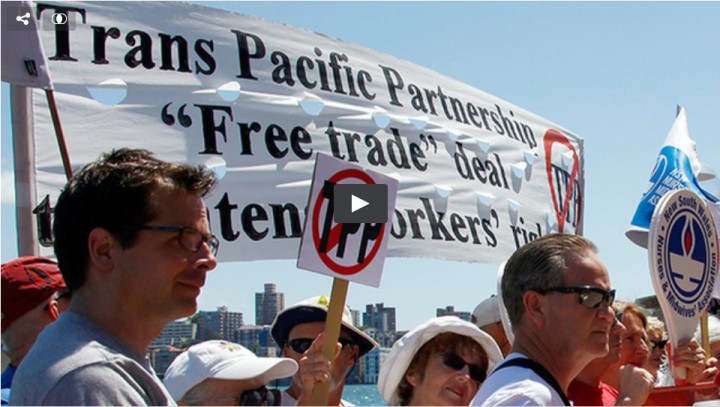As the Obama administration praises the benefits of the Trans-Pacific Partnership (TPP), backlash continues to grow against the deal. WikiLeaks has just published another section of the secret text — this one about public healthcare and the pharmaceutical industry. Newly revealed details of the draft show the TPP would give major pharmaceutical companies more power over public access to medicine and weaken public healthcare programs. The leaked draft also suggests the TPP would prevent Congress from passing reforms to lower drug costs. One of the practices that would be allowed is known as “evergreening.” It lets drug companies extend the life of a patent by slightly modifying their product and then getting a new patent. We speak to Peter Maybarduk of Public Citizen and John Sifton of Human Rights Watch about their concerns.
Transcript
This is a rush transcript. Copy may not be in its final form.
NERMEEN SHAIKH: House Republicans are set to push for a vote as soon as Friday on approving a measure to give President Obama fast-track authority to negotiate the Trans-Pacific Partnership deal. The secretive TPP deal involves 12 countries and nearly 40 percent of the global economy. On Wednesday, WikiLeaks released a leaked draft of another chapter of the secret negotiating text, this time the TPP’s so-called Healthcare Annex. Newly revealed details of the draft show the TPP would give major pharmaceutical companies more power over public access to medicine and weaken public healthcare programs. The leaked draft also suggests the TPP would prevent Congress from passing reforms to lower drug costs. One of the practices that would be allowed is known as “evergreening.” It lets drug companies extend the life of a patent by slightly modifying their product and then getting a new patent. This is a video explaining the practice, produced by Doctors Without Borders.
NARRATOR: Evergreening. Sounds nice, doesn’t it? But evergreening is what drug companies do when they want to increase their profits. And it leaves people in developing countries without the medicines they need. Here’s how. A drug company develops a new drug and is rewarded with a patent. The patent stops other producers making the medicine for 20 years. So the drug company can charge very high prices without anyone else undercutting them—for 20 years. When the patent ends, other producers can come in and compete with each other, and bingo, the prices come tumbling down. So the medicines become affordable for everyone. But the drug companies want more profits, so they make a tiny little change to their drugs and ask for another 20-year patent.
AMY GOODMAN: Well, for more, we’re joined by two guests in Washington, D.C. Peter Maybarduk is director of Public Citizen’s Global Access to Medicines Program. And John Sifton is advocacy director with Human Rights Watch. Today he’s hosting a briefing at the National Press Club on human rights and humanitarian concerns about the Trans-Pacific Partnership, along with Oxfam America and the Council on Global Equality.
Read the Full Transcript in Democracy Now!










